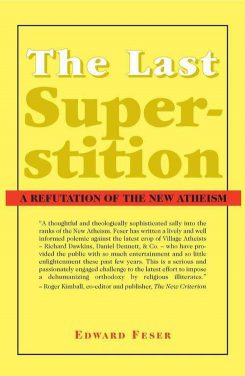The Last Superstition: Conclusion
So now that we’ve come to the end of the book, what have we learned? There are two comments that stick in my mind. One is by Steve Watson:
I think Aristotle systematized a lot of what we now call folk physics and folk biology, which was a good enough way to start, back then
While neither Steve nor I offer any data to support this, I think it’s a pretty good explanation: a lot of what Aristotle thought, or at least what Feser reports as Aristotle’s belief, reads like someone trying to systematize what he saw around him — what would later become physics — but handicapped by not having observational tools like microscopes, or even mental tools like the scientific method.
The other comment is at Chris Hallquist’s blog, by reader Patrick:
[Feser] interacts with people in two ways. 1) Patiently explaining what Augustinian metaphysics is, in the apparently belief that if he just explains in sufficient detail, people will have an “Aha!” moment and come around. 2) Railing at them in rage because, in spite of all his explanations, they refuse to admit that Augustinian metaphysics are self evidently true. Obviously, since Augustinian metaphysics are self evidently true per hypothesis, the only explanation for someone’s refusal to admit that they’re true is either astounding stupidity and ignorance, or else a willful and culpable refusal to publicly admit what they know to be true.
This comes through well in The Last Superstition. For all his explanations of Plato’s and Aristotle’s ideas, he fails to answer a lot of elementary questions, like how we can find out which Forms an object instantiates. This makes sense if he thinks what he’s explaining is obvious, and can’t see it from an outsider’s perspective.
As for his attitude toward people who don’t agree with him, well, I’ve mentioned Feser’s tone a few times. Suffice it to say that I agree with Patrick.
But beyond the book itself, what else can we learn?
I was originally surprised at the number of positive reviews the book got on Amazon, given the number of elementary fallacies Feser commits. But in retrospect, it makes sense: like all successful apologists, Feser is good at reassuring people who already hold religious beliefs that it’s okay to hold those beliefs. This is partly due to what Steve Watson pointed out above: that Aristotle tried to formalize folk science. That is, Feser is able not only to present a framework of ideas rather than a grab-bag of intuitions, he can also recruit one of the biggest names in philosophy to lend weight to his argument.
Finally, I think this book is useful for its insight into someone else’s mind. In particular, it seems to me that Platonic Forms (and Aristotle’s essences) are a type of essentialism. There are (at least) two ways of looking at the world: one is that things are whatever they are, and it’s up to us to draw boundaries; some things are worth calling “triangle”, and some aren’t. A triangle drawn with straightedge and pencil may not be perfect, but it can still be called a triangle; but at some point, a chalk doodle is so different from a perfect triangle that it no longer deserves the name. A person who hasn’t eaten meat for a day probably shouldn’t be called a vegetarian, but someone who hasn’t eaten meat for ten years probably should. That is, sometimes there are clear ways to define the categories that interest us, while at other times we need to draw arbitrary lines. But ultimately, it’s up to us.
The other view is that the categories are already there, and have been since the beginning of time. We merely need to figure out which category an item belongs in. In my experience, a lot of creationists think this way: they can’t grasp the idea of new species appearing, because to them, if the descendants of a fish are so different as to not be worth calling fish anymore, then they must be in one of the other categories: dogs, or birds, or dinosaurs, or something.
Likewise, as Feser argues, if you see a three-week-old fetus and a thirty-year-old woman as having the same human essence, as their single most important characteristic, then it’s easy to see abortion as murder.
So while I don’t think the book adds to my understanding of either science or philosophy, it is useful in understanding how a lot of people on the right think.

Absolutely fantastic. A great jumping off point for learning more about Thomist thought, and how it doesn’t apply to anything with a pulse, or without a pulse, or the platonic form of having a pulse (or not).